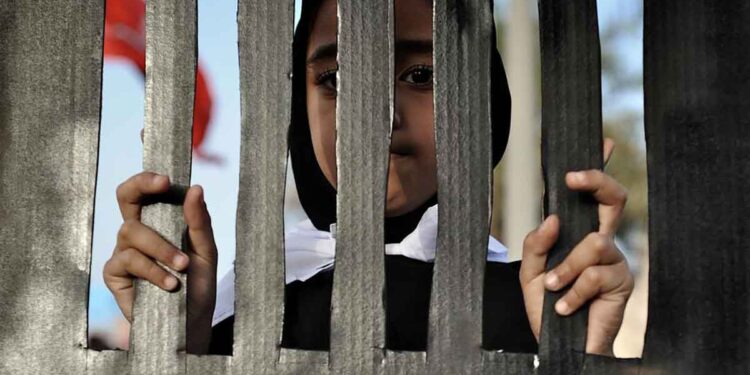Local reports claim that Covid-19 is now spreading through Bahrain’s infamous Jaw prison, with detainees demanding their immediate release.
Last year, on 17 March 2020, the Bahraini Interior Ministry announced the release of 1,486 detainees in light of the Covid-19 epidemic. At least 300 of those released were political detainees.
However, none of the more prominent political leaders or human-rights defenders were among those released at the time, including Zakiya Al Barboori.
Al Barboori, a social and religious activist in her town of Nuwaidrat, was amongst the detainees whose nationality was revoked in February 2019, following a Baharain court ruling against her and 10 others. Al Barboori is the first Bahraini woman to have had her nationality revoked.
The issue of violations of Bahrainee political detainees’ human rights has continued to mark the country’s international relations.
On 10 February 2021, representatives of the European Union’s (EU) Foreign Affairs and Security Policy branch met with Bahrain officials, including Abdullatif bin Rashid Al Zayani, Minister of Foreign Affairs.

At the meeting, a Cooperation Agreement was signed, which “provides an institutional framework for political dialogue and cooperation in areas such as trade, research, and innovation, clean energy and renewables”, as the EU reported at the time.
And, the EU’s report added, “the importance of human rights in the bilateral relationship was underlined”.
On 10 February 2021, representatives of the European Union’s (EU) Foreign Affairs and Security Policy branch met with Bahrain officials, including Abdullatif bin Rashid Al Zayani, Minister of Foreign Affairs.
At the meeting, a Cooperation Agreement was signed, which “provides an institutional framework for political dialogue and cooperation in areas such as trade, research, and innovation, clean energy and renewables”, as the EU reported at the time.
And, the EU’s report added, “the importance of human rights in the bilateral relationship was underlined”.
In the weeks before the February meeting, Josep Borrell, Vice President of the European Commission, and Eamon Gilmore, EU Special Representative for Human Rights, had in a joint letter to Bahraini leaders raised “concerns about the deterioration of the human rights situation in Bahrain”.
In the letter, Borrell and Gilmore wrote “Bahrain’s February 2011 Arab Spring uprising was an event which many hoped would herald a new era of democracy in the country. However, since the government’s violent suppression of the protests, promised reforms have failed to materialize. The leaders of the protest movement, some of them now elderly, continue to languish in prison.”
They went on to mention the repression of political dissidents and human rights defenders since 2017, and the “medical negligence and mistreatment in Jaw prison” – where, now, a deadly disease is spreading.






























